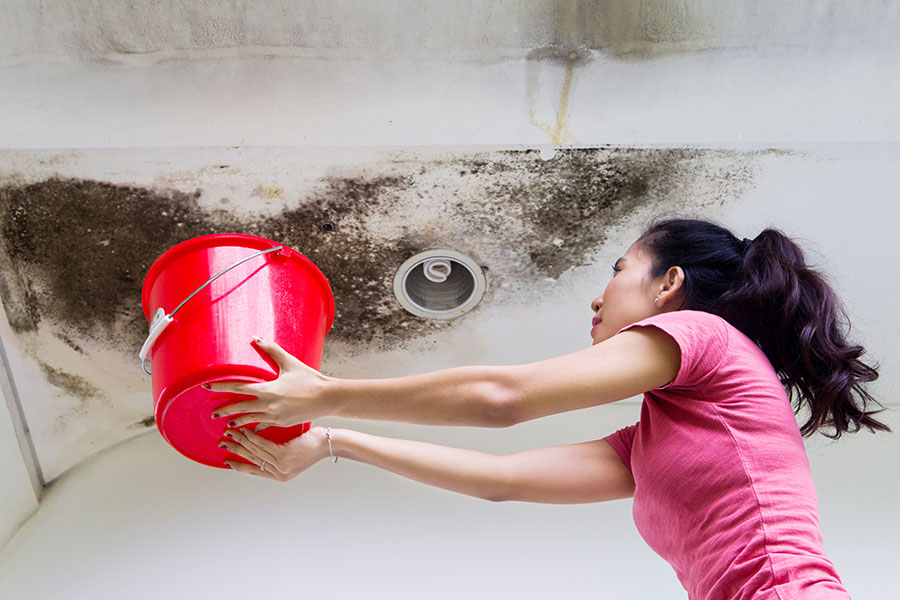Water damage and mold
Mold only needs two things to survive: water and organic food. Chances are, if there are heavy rains and your home has undiscovered leaks, you’ll likely have a mold problem in the near future. To put it plainly, water damage and mold go hand in hand. Mold may sound like an especially concerning, rare issue found in only the dingiest of homes. In reality, mold lives everywhere. Even in the cleanest spaces, mold spores can be found floating around. When it comes to mold in your home, the key is to ensure mold levels stay in an acceptable range. It’s impossible to eliminate mold entirely but if one area gets too damp, mold can fester at elevated levels without your knowledge. Mold becomes problematic in these concentrated, unseen situations.
Though it may sound surprising, mold can actually be a good thing in certain settings. In nature, mold breaks down organic materials to feed and nourish soil. Mold makes somes cheese taste pretty great too. If you notice mold in your home, don’t freak out! Mold is natural and fixable.
Mold only becomes a problem when it grows excessively. Like we said, all it takes for a mold infestation to grow is a damp, dark area. Often caused by heavy rains, humidity or leaks, excessive mold can become hazardous to your home and family. The key is to remain diligent and take preventive measures before the rainy season approaches to fend off water damage from mold.
Water and mold damage restoration
In the event that mold infests your home, it’s important to understand the water and mold damage restoration process. First thing’s first: hire an expert! Mold is not something to mess around with. To solve the problem efficiently and effectively, you will need a qualified restoration service to handle your water and mold damage restoration.
Water and mold damage restoration includes a wide spectrum of services and solutions. In some cases, you may be able to clean mold problem areas to resolve the infestation. Sometimes, mold damage requires more intensive solutions. Additionally, mold restoration may require testing for asbestos and lead. It’s important to get these done before the rain causes more serious damage. In order to determine which route to take in getting rid of mold in your home, contact a professional to inspect and give you advice. Before you can begin the remediation and treatment process, it is essential to get you space tested. A certified mold inspector can take samples from your home and get them tested in a laboratory. Without taking this step, it’s impossible to say if you have a mold problem or not.
Mold damage from water leaks
As we enter the rainiest season of the year, it’s important to be on the look out for mold damage. Though rainy days can feel cozy and relaxing, they may be causing serious, underlying issues in your space. If your home leaks in any places, the rain can saturate building materials and cause mold to grow. After all, like we mentioned before, all it takes is a damp place for mold spores to latch on and thrive.
If you’re worried about mold from water leaks, we will give you a couple preventative techniques to keep it out. In order to protect your home most effectively, it’s crucial to think about moisture itself rather than the mold. To put it in simple terms, moisture is the illness and mold is just a symptom. You can remove mold all you want but if the leak or moisture source is not diagnosed, the pesky mold symptoms will keep coming back.
The first line of defense from mold is your gutters. Before the rainy season approaches, ensure your gutters are intact and clear of debris. Gutters keep rain and other moisture from coming in contact with the side of your home and it’s foundation. If gutters become clogged, they can tear away at your roof and create leaky cracks that lead to mold issues. We recommend calling in an expert to clean and inspect your gutters as it’s easy for the untrained eye to miss problem areas. Another way to prevent mold from water leaks is to ensure your living spaces have adequate ventilation. Good ventilation circulates fresh air and prevents allergens and mold spores from spreading through your home.
If the rain comes before you get the chance to perform these prevention tactics, make sure to inspect your home once the rain stops. Look for wet areas, moisture or other signs of leaks. Checking for visible mold from water leaks will give you peace of mind and confirmation that there is no serious problem. Though, as always, it’s better to be safe than sorry. Even if you don’t notice a problem area, we still recommend calling in an expert to confirm that your home is waterproof and mold-free. It is entirely possible that you may have a mold problem that lives beyond what you can see.
Experienced and professional water damage testing
At Rarefied Air Environmental, we have a team of professionals who can properly test your home for mold and determine whether harmful mold exists. Contact us today to ensure your home is clean, safe and mold-free.

